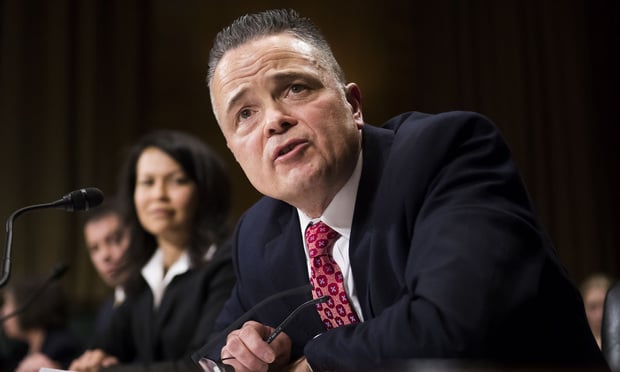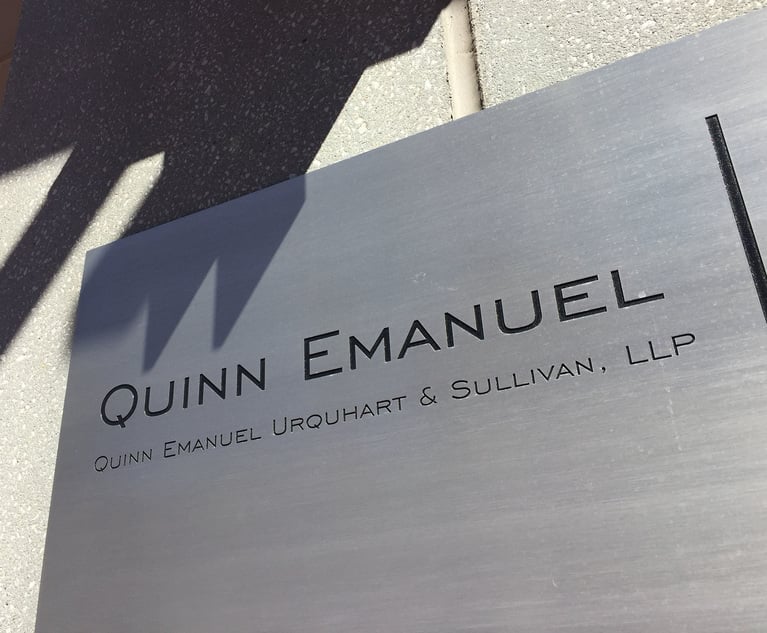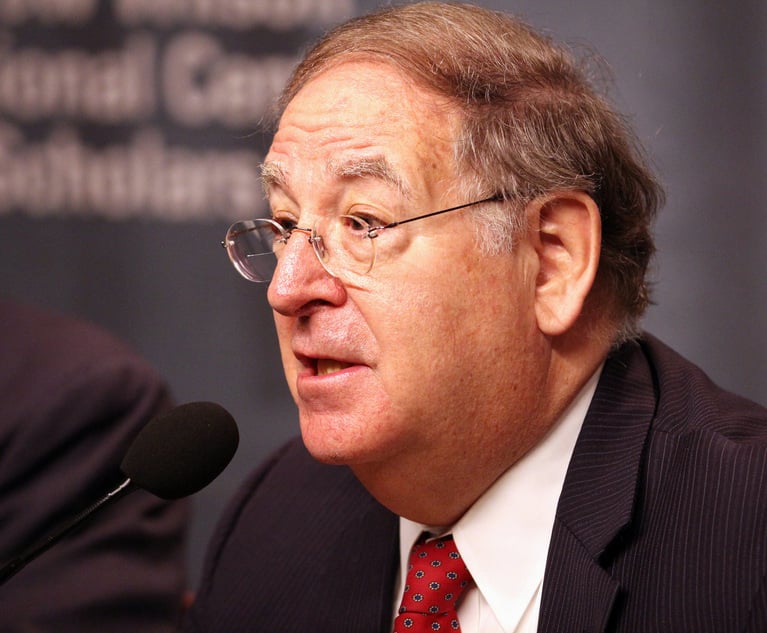Key Moments From Civil Division Nominee Jody Hunt's Senate Hearing
Hunt, a career DOJ attorney who served as U.S. Attorney General Jeff Sessions' chief of staff last year, was asked by lawmakers about the special counsel's Russia investigation, the AG's almost-resignation, the firing of U.S. attorneys last year and more.
March 07, 2018 at 03:51 PM
7 minute read
 Joseph “Jody” Hunt testifies before the Senate Judiciary Committee during his confirmation hearing to Assistant Attorney General for the Civil Division at the U.S. Department of Justice, on March 7. Photo Credit: Diego M. Radzinschi/ALM
Joseph “Jody” Hunt testifies before the Senate Judiciary Committee during his confirmation hearing to Assistant Attorney General for the Civil Division at the U.S. Department of Justice, on March 7. Photo Credit: Diego M. Radzinschi/ALM Joseph “Jody” Hunt, President Donald Trump's nominee to lead the Justice Department's Civil Division, spent much of his nomination hearing Wednesday talking about his boss, U.S. Attorney General Jeff Sessions.
Hunt's nomination was announced in September last year. Testifying before lawmakers on the Senate Judiciary Committee Wednesday, Hunt was asked repeatedly about his work as Sessions' chief of staff. He served in that position from February last year until October, through several key points in Sessions' turbulent first year on the job.
Since October 2017, Hunt has been working as a senior adviser in the DOJ's Office of Legal Policy.
Here's what Hunt had to say:
On Comey: Senators asked Hunt about several events related to the firing of former FBI Director James Comey last May. Sessions testified before Congress last year that Hunt was in the room with him during a February 2017 meeting when Comey asked the attorney general not to leave him alone again with the president.
Hunt confirmed that Wednesday, and added that Comey's chief of staff, James Rybicki, was also present. Rybicki resigned earlier this year. Hunt said Comey did not say exactly what he and the president had discussed in prior one-on-one meetings, and he echoed Sessions' testimony that in response to Comey, the AG discussed the DOJ's policy about contacts with the White House. Comey had said the AG did not respond to his concerns.
Hunt was also asked about Sessions' letter to Trump recommending he fire Comey. Hunt said he was involved in many meetings with Sessions on many topics, including about Comey, but would not go further or answer questions about why he was fired.
On Mueller: Hunt told lawmakers during the hearing that, like Sessions, he is recused from the investigation led by the special counsel, Robert Mueller, into Russian interference in the 2016 election and ties to the Trump campaign. He said he would stay recused if confirmed.
Sen. Sheldon Whitehouse, D-Rhode Island, also asked who “oversees” and enforces Sessions' recusal. Hunt said Deputy Attorney General Rod Rosenstein has authority over Mueller.
“No matters reach the fifth floor, which is where the attorney general is, without coming through the fourth floor, which is where the deputy attorney general is,” Hunt said. “And I can tell you that in my time in the Attorney General's Office, nothing with respect to this matter came up to [the] Attorney General's Office.”
On Sessions' almost-resignation: Last summer, when tensions were at a high between Sessions and Trump, press reports said that Sessions drafted a resignation letter. It was also reported that Hunt told then-White House Chief of Staff Reince Priebus that Sessions had no intention of stepping down. Asked by Sen. Richard Blumenthal, D-Connecticut, if that was true, Hunt declined to answer, saying that communications between himself and the senior White House official could be privileged.
“I was, of course, as [Sessions'] chief of staff, involved in many decisions that he made and was with him for many decision points … and I had many discussions with him on a variety of subjects, but I wouldn't want to disclose any particular advice I gave to him with respect to a communication he may have had with the White House.”
On the DOJ's independence: Sen. Mazie Hirono, D-Hawaii, asked Hunt about the importance of the DOJ's independence from the executive branch. In recent months, the president has called for the DOJ to investigate his political rivals.
“It's very important,” Hunt said. “As part of the executive branch, it's important that the Department of Justice maintain appropriate independence—that we make our decisions based on what the law is and not based on political influence or political objectives,” Hunt said.
Later, Hirono asked about Trump's routine criticisms of the DOJ, Rosenstein, Sessions and others, and whether Hunt had any similar experiences with other presidents in his 20 years at the DOJ. Hunt said the DOJ is not “immune” from criticism across administrations.
“I can tell you that as a civil servant, we try to block that out and do our jobs professionally,” Hunt said.
Hirono called his answer “tactful.”
On concerns about Criminal Division nominee Brian Benczkowski: Another question related to the delay of the confirmation of another DOJ nominee, Kirkland & Ellis partner Brian Benczkowski, to lead the Criminal Division. Despite having his confirmation hearing months ago, the Senate hasn't confirmed Benczkowski yet.
Whitehouse said Wednesday that was partly because lawmakers were worried about his closeness with Sessions. He said there were concerns that as leader of the Criminal Division, Benczkowski would learn about certain aspects of Mueller's investigation if the special counsel sought permission to take certain actions. Whitehouse said it was possible Benczkowski would share information via a “back channel” of communications with Sessions.
Hunt repeated that he was rescued, so he couldn't comment on the issue specifically. Hunt did say that he expected that Rosenstein would oversee any actions taken by Mueller, not the Criminal Division leader.
On Preet Bharara and Trump: Early last year, former U.S. attorney for the Southern District of New York Preet Bharara was fired along with dozens of other Obama-era U.S. attorneys. Bharara said, however, that Trump had personally called him after the election and asked him to stay on. Later, shortly before he was fired, Bharara said one of Trump's assistants asked him to call the president. Bharara consulted with Hunt about whether to call back.
Hirono asked about this discussion, and Hunt said he advised Bharara not to return the president's call.
“[Bharara] didn't feel comfortable calling back to the president without knowing what the subject of the call was about,” Hunt said. “And I agreed with him that if he did not know, and was not comfortable, that he should not return that call.”
Hunt said he did not know why Trump fired Bharara, but noted that all holdover U.S. attorneys were also fired at the same time.
This content has been archived. It is available through our partners, LexisNexis® and Bloomberg Law.
To view this content, please continue to their sites.
Not a Lexis Subscriber?
Subscribe Now
Not a Bloomberg Law Subscriber?
Subscribe Now
NOT FOR REPRINT
© 2025 ALM Global, LLC, All Rights Reserved. Request academic re-use from www.copyright.com. All other uses, submit a request to [email protected]. For more information visit Asset & Logo Licensing.
You Might Like
View All
Quinn Emanuel Files Countersuit Against DOJ in Row Over Premerger Reporting
3 minute read
'Thoughtful Jurist': Maryland US District Senior Judge Messitte Dies After Short Illness
4 minute read
'Religious Discrimination'?: 4th Circuit Revives Challenge to Employer Vaccine Mandate
2 minute read
4th Circuit Revives Racial Harassment Lawsuit Against North Carolina School District
3 minute readTrending Stories
- 1'Didn't Notice Patient Wasn't Breathing': $13.7M Verdict Against Anesthesiologists
- 2'Astronomical' Interest Rates: $1B Settlement to Resolve Allegations of 'Predatory' Lending Cancels $534M in Small-Business Debts
- 3Senator Plans to Reintroduce Bill to Split 9th Circuit
- 4Law Firms Converge to Defend HIPAA Regulation
- 5Judge Denies Retrial Bid by Ex-U.S. Sen. Menendez Over Evidentiary Error
Who Got The Work
J. Brugh Lower of Gibbons has entered an appearance for industrial equipment supplier Devco Corporation in a pending trademark infringement lawsuit. The suit, accusing the defendant of selling knock-off Graco products, was filed Dec. 18 in New Jersey District Court by Rivkin Radler on behalf of Graco Inc. and Graco Minnesota. The case, assigned to U.S. District Judge Zahid N. Quraishi, is 3:24-cv-11294, Graco Inc. et al v. Devco Corporation.
Who Got The Work
Rebecca Maller-Stein and Kent A. Yalowitz of Arnold & Porter Kaye Scholer have entered their appearances for Hanaco Venture Capital and its executives, Lior Prosor and David Frankel, in a pending securities lawsuit. The action, filed on Dec. 24 in New York Southern District Court by Zell, Aron & Co. on behalf of Goldeneye Advisors, accuses the defendants of negligently and fraudulently managing the plaintiff's $1 million investment. The case, assigned to U.S. District Judge Vernon S. Broderick, is 1:24-cv-09918, Goldeneye Advisors, LLC v. Hanaco Venture Capital, Ltd. et al.
Who Got The Work
Attorneys from A&O Shearman has stepped in as defense counsel for Toronto-Dominion Bank and other defendants in a pending securities class action. The suit, filed Dec. 11 in New York Southern District Court by Bleichmar Fonti & Auld, accuses the defendants of concealing the bank's 'pervasive' deficiencies in regards to its compliance with the Bank Secrecy Act and the quality of its anti-money laundering controls. The case, assigned to U.S. District Judge Arun Subramanian, is 1:24-cv-09445, Gonzalez v. The Toronto-Dominion Bank et al.
Who Got The Work
Crown Castle International, a Pennsylvania company providing shared communications infrastructure, has turned to Luke D. Wolf of Gordon Rees Scully Mansukhani to fend off a pending breach-of-contract lawsuit. The court action, filed Nov. 25 in Michigan Eastern District Court by Hooper Hathaway PC on behalf of The Town Residences LLC, accuses Crown Castle of failing to transfer approximately $30,000 in utility payments from T-Mobile in breach of a roof-top lease and assignment agreement. The case, assigned to U.S. District Judge Susan K. Declercq, is 2:24-cv-13131, The Town Residences LLC v. T-Mobile US, Inc. et al.
Who Got The Work
Wilfred P. Coronato and Daniel M. Schwartz of McCarter & English have stepped in as defense counsel to Electrolux Home Products Inc. in a pending product liability lawsuit. The court action, filed Nov. 26 in New York Eastern District Court by Poulos Lopiccolo PC and Nagel Rice LLP on behalf of David Stern, alleges that the defendant's refrigerators’ drawers and shelving repeatedly break and fall apart within months after purchase. The case, assigned to U.S. District Judge Joan M. Azrack, is 2:24-cv-08204, Stern v. Electrolux Home Products, Inc.










